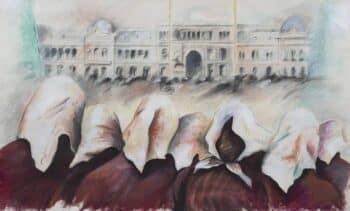Dear friends,

Emilio Pettoruti (Argentina), Arlequín (‘Harlequin’), 1928.
Greetings from the desk of Tricontinental: Institute for Social Research.
Before he won Argentina’s presidential election on 19 November, Javier Milei circulated a video of himself in front of a series of white boards. Pasted on one board were the names of various state institutions, such as the ministries of health, education, women and gender diversities, public works, and culture, all recognised as typical elements of any modern state project. Walking along the board, Milei ripped off the names of these and other ministries while crying afuera! (‘out!’) and declaring that if elected president, he would abolish them. Milei vowed not only to shrink the state but to ‘blow up’ the system, often appearing at campaign events with a chainsaw in hand.
The reaction to Milei’s viral video and other such stunts was as polarised as the Argentinian electorate. Half of the population thought that Milei’s agenda was madness, the sign of a far right out of touch with reality and rationality. The other half thought that Milei displayed precisely the kind of boldness required to transform a country mired in poverty and skyrocketing inflation. Milei did not just win the election; he won it handily, defeating the outgoing government’s finance minister, Sergio Massa, whose stale, centrist promises of stability did not sit well with a population that has lived with instability for decades.
Milei’s proposals to solve the downward spiral of the Argentinian economy are not unique, nor are they practical. Dollarisating the economy, privatisating state functions, and suppressing workers’ organisations are pillars of the neoliberal austerity agenda that has plagued the world for the past several decades. To debate Milei on this or that policy misses the point behind the ascendancy of the far right across the world. It is not what they say they will do to solve the world’s actual problems that matters so much as how they say it. In other words, for politicians like Milei (or Brazil’s former President Jair Bolsonaro, India’s Prime Minister Narendra Modi, and former U.S. President Donald Trump), it is not their policy proposals that are attractive, but their style—the style of the far right. People like Milei promise to take the country’s institutions by the throat and make them cough up solutions. Their boldness sends a frisson through society, a jolt that masquerades as a plan for the future.

Fátima Pecci Carou (Argentina), Evita Ninja, 2020.
There was a time when the general mood of the international middle class centred on guaranteeing convenience: they hated the inconvenience of being stuck in traffic jams and queues, of being unable to get their children into the school of their choice, and of being unable to buy—even if by credit—the consumption goods that made them feel culturally superior to each other and to the working class. If the middle class was not inconvenienced, then that class—which shapes the electorate of most liberal democracies—would be content with promises of stability. But when the entire system convulses with inconveniences of one kind or another—such as inflation, the rate of which was 142.7% in Argentina at the start of the elections in October—then the assurance of stability holds little weight. The political forces of the centre, such as of Milei’s opponent, are trapped in a habit of speaking about stability while their country burns. They promise little more than incremental destruction. In this context, timidity is not always attractive to the middle class, let alone to workers and peasants, who require a bold vision rather than a fixation on mild cost-of-living increases alongside taxation holidays for big businesses.
This timidity is not merely about the character of the political force that seizes the moment. If that were the case, then merely shouting louder should win the centre-left and left votes. Rather, it reflects the increasing timidity of the centre-left and its political platform, deflated by the immense stresses and strains that have damaged society at the neurological level. The precariousness of employment, the state’s retreat from providing care for its people, the privatisation of leisure, the individualisation of education, and other strains have, together, produced overwhelming social problems (not to mention the impact of the climate catastrophe and brutal wars). The political horizon of large sections of the centre-left has been reduced to merely managing this decaying civilisation (as our latest dossier, What Can We Expect from the New Progressive Wave in Latin America?, points out). The persistent failure of governments to solve the problems of society has made politics itself foreign to large sections of the public.
Two generations of people have been raised in the world of austerity, sold falsehoods by technocratic experts who promise to improve their social condition through neoliberal economic growth. Why should they believe any expert who now cautions against the economic cannibalism promoted by the far right? Besides, the erosion of education systems and the reduction of the mass media into a gladiatorial contest have meant that there are few avenues for serious public discussion about the troubles facing our societies and the solutions needed to address them. Anything can be promised, anything can be implemented, and even when neoliberal agendas create catastrophic outcomes—as with Modi’s demonetisation scheme in India—they are touted as successes and their leaders are celebrated.
Neoliberalism has increased not only the precariousness of the global majority, but also sentiments of anti-intellectualism (the death of the expert and expertise) and anti-democratisation (the death of serious, democratic public education and discussion). In this context, Milei’s triumph is less about him than it is a product of a broader social process, one that is not exclusive to Argentina but holds true around the world.

Raquel Forner (Argentina), Mujeres del Mundo (‘Women of the World’), 1938.
Pillars of neoliberalism such as the privatisation and commodification of state functions created the social conditions for the rise of twin problems: corruption and crime. The deregulation of private enterprise and the privatisation of state functions have deepened the nexus between the political class and the capitalist class. Granting state contracts to private enterprises and cutting back on regulations, for instance, has provided immense avenues for bribes, kickbacks, and transfer payments to proliferate. Simultaneously, the increased precarity of life and the evisceration of social welfare increased the volume of petty crime, including through the drug trade (as demonstrated by a Tricontinental research project on the war on drugs and imperialism’s addictions, which will bear fruit soon).
The far right has fixated on these problems not in an effort to address the roots of the problem, but to achieve two results:
- By attacking the corruption of state officials but not of capitalist enterprises, the far right has been able to further delegitimise the state’s role as a guarantor of social rights.
- Using the general social malaise around petty crime, the far right has used every instrument of the state—which they otherwise decry—to attack the communities of the poor, garrison them under the guise of crime prevention, and rob them of any self-representation. This attack is extended against anyone who gives voice to the working class and the poor, from journalists to human rights defenders, from left politicians to local leaders.
The far right’s misleading representation and weaponisation of corruption and crime has placed the left at a deep disadvantage. On these issues, the far right has an intimate relationship with old social democracy and traditional liberalism, who generally accept the content of the far-right agenda, objecting only to their brash approach. This leaves the left with few political allies when it comes to these core battles, forcing it to defend the state form despite the corruption that has become endemic to it through neoliberal policy. Meanwhile, the left must continue to defend working-class communities from state repression, despite the real problems of crime and insecurity that confront the working class due to the collapse of employment and social welfare. The dominant debate is framed around the surface-level realities of corruption and crime and is not permitted to probe deeper into the neoliberal roots of these problems.

Diana Dowek (Argentina), Las madres (‘The Mothers’), 1983.
When the election results came in from Argentina, I asked our colleagues in Buenos Aires and La Plata to send me some songs that capture the current mood. Meanwhile, I buried myself in Argentinian poetry of loss and defeat, mostly the work of Juana Bignozzi (1937—2015). However, this was not the mood they wanted to put forward in this newsletter. They wanted something robust, something that reflects the boldness with which the left must respond to our current moment. This mood is captured by the rapper Trueno (b. 2002) and the singer Víctor Heredia (b. 1947), crossing generations and genres to produce the moving song Tierra Zanta (‘Sacred Earth’) and an equally moving video. And so, from Argentina:
I came into the world to defend my land.
I am the peaceful saviour in this war.
I will die fighting, firm as a Venezuelan.
I am Atacama, Guaraní, Coya, Barí, and Tucáno.
If they want to throw the country at me, we’ll lift it up.We Indians built empires with our hands.
Do you hate the future? I come with my brothers and sisters
from different parents, but we don’t stay apart.
I am the fire of the Caribbean and a Peruvian warrior.
I thank Brazil for the air that we breathe.Sometimes I lose, sometimes I win.
But it is not in vain to die for the land that I love.
And if outsiders ask what my name is,
my name is ‘Latin’ and my surname is ‘America’.
Warmly,
Vijay

